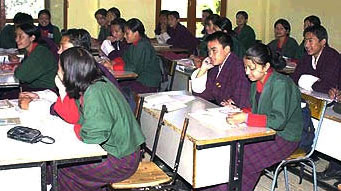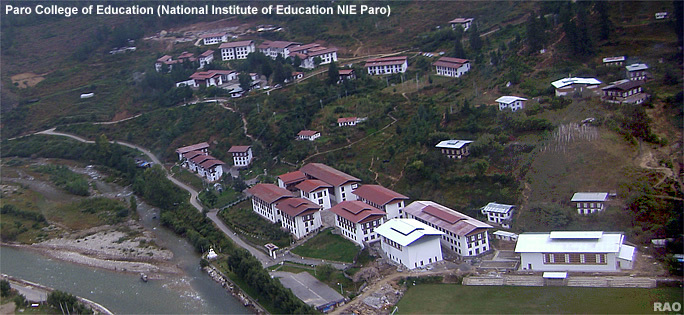 |
Bhutan's
Education |
|
 |
Bhutan
Information |
|
|
 |
|
Towards
a better standard of English
|

|
 |
| Bhutanese
high school graduates should be able to speak and write clearly in
English, with a sound foundation in grammar and a rich vocabulary. They
should have developed critical thinking skills and should be well read
in both fiction and non-fiction. This is an education policy vision, prescribed
in a new document called the "The Silken Knot: Standards for English
in Schools in Bhutan". |
|
Produced
by the Paro-based centre for educational research and development (CERD),
the document is the first forward-looking attempt by the education department
to set a standard for "teaching, learning and knowing".
The
concept divides English into four major frameworks of learning: speaking
and listening, writing, reading and literature, and language. Each framework
has four parts - statement of standards, indicators of levels of achievement,
teacher inputs, and provisions that are necessary if the standards are
to be met. Each part deals with a critical component of the document.
For
example, indicators of levels of achievement describe the type and range
of performance that can be expected of students in each area of English
study as they progress through the school system, from classes PP to 12.
| Bhutanese
students need to be encouraged to read widely and to read |
 |
There
are clear instructions for teachers for each level - suggesting lessons
that need to be planned, knowledge and skills that need to be learned by
teachers themselves. A description for teacher's input in writing for level
six (classes 7-8), for instance, says: teachers will assist students to
use language and sentence structure to create an effect or mood.
| CERD
: a concept whose time has come |
 |
 |
| The
centre for educational research and development was established by the
ministry of health and education "to carry out systematic studies on different
aspects of education provided by the government".
It
is expected to generate ideas for enriching curriculum planning, to assist
in teacher preparation and to support teachers in the field. |
|
Before its
establishment in April, 2001, the concept of research in education was
either absent or not widely known.
It
is expected that CERD will ultimately grow into a leading educational think-tank
and research organisation with a core body of professional staff. CERD
plans to forge links with relevant and reputed research institutes and
organisations in the region and elsewhere. It also hopes to establish a
mechanism for quality standards in education and promote a spirit of enquiry
and analysis through "action research".
Since
its establishment, the centre has carried out a study on the improvement
of primary education with UNESCO assistance. It actively collaborated with
the DDC to produce a Dzongkha-English dictionary. It assists the English
subject committee of the curriculum and professional support division (CAPSD)
and supports the Paro NIE "in providing content enrichment input".
Through
this experiment, which the centre describes as "a call to come to the basics",
teachers of Paro valley come together to talk about their subjects to get
a wider understanding of it. A major task of the centre being to promote
the standard of English in high schools, it came up with the Silken Knot.
It will now carry out studies and formulate national standards for other
subjects like Dzongkha, Mathematics, Science and Social Studies.
| CERD
is supported by NIE, Paro |
The
director of CERD said that the Silken Knot, a metaphor which he thinks
best epitomizes education, is "a response to the perceived decline" of
English standard in the country.
 |
| Countries like the UK, US, and New Zealand
have all formulated national standards. The centre formulated the standards
with the voluntary assistance of a retired professor from the University
of New Brunswick in Canada.
In
developing the standards CERD, among other things, discussed English and
its teaching with educators and other professionals, studied existing national
documents related to the subject, and statements of standards for English
in English-speaking countries of the world. |
|
CERD
also observed more than 150 classes covering 80 percent of the high schools
in the country, conducted interviews with teachers and educationists, and
held over two dozen workshops around the country.
In
developing the standards CERD, among other things, discussed English and
its teaching with educators and other professionals, studied existing national
documents related to the subject, and statements of standards for English
in English-speaking countries of the world. CERD also observed more than
150 classes covering 80 percent of the high schools in the country, conducted
interviews with teachers and educationists, and held over two dozen workshops
around the country. Through field visits CERD discovered a wide variety
of standards in schools across the country. Many teachers had not taken
advanced courses in English. Some did not study English beyond grade 10.
Many had studied up to grade 12 and the elective courses offered in the national institutes of education (NIE).
There
were deficiencies and shortfalls in teaching, learning and the curriculum
content of English. The existing English curriculum was one-sided with
too much emphasis on old fictional literature. Teachers spent almost all
their time explaining texts to students and students spent all their time
writing down what the teacher said. This habit had become deeply entrenched
in the education system. Beyond class eight, English had been reduced to
"the transmission of approved information about assigned literature texts
and memorizing that information for examinations".
| Decline
in the standard of English in Bhutan? |
Is
there a decline in the standard of English in schools in Bhutan, or is
the notion merely "perceived" ? There is no definite answer. One group
- including many teachers around the country - feels that the standard
is deteriorating. Other teachers pointed out that the decline could be
attributed to the "cumulative effect" of many factors. For instance, the
young age of students and cramped classrooms could have a lot to do with
the falling standard. Some educationists, however, do not agree that the
standard of English is declining. Students themselves think that they "are
doing pretty fine in English".
The
Silken Knot in fact hopes to address all these shortcomings, real or perceived,
prevailing in the teaching and learning of English.
It
brings grammar and a whole range of language studies back into the classroom.
It incorporates modern and non-fictional literature such as essays, letters,
reports, biographies, and scientific and media writing in the curriculum
in a big way. Copies of The Silken Knot have been distributed to all senior
and junior high schools in the country. Some schools and educational institutions
have already begun implementing the document, which they see as a "welcome
and required" challenge. Teachers feel that the standards document is the
"beacon" they have long been looking for. But one thing about the beacon
the teachers must certainly do before anything else - understand it thoroughly
themselves.
| Contributed
by KUENSEL, Bhutan's national newspaper |
 |
top
|
Links
|
 |
 |
 |
External
links |
|







